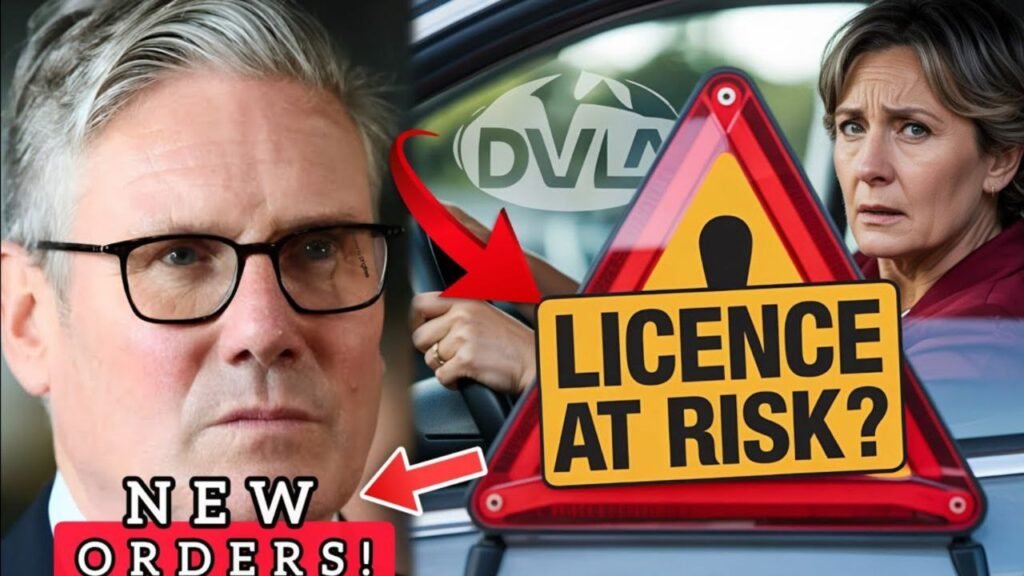The UK’s Driver and Vehicle Licensing Agency (DVLA) has recently issued fresh guidance for older motorists, sparking debate across the country. According to new updates linked with the Highway Code, drivers over the age of 70 now face stricter rules regarding licence renewals, health checks, eyesight standards, and medical declarations.
This news has created shockwaves among senior drivers, many of whom worry about their independence and the possibility of losing their licences. On the other hand, road safety experts argue that the changes are necessary to reduce accidents and ensure safer roads for everyone.
In this article, we’ll cover everything you need to know about these new DVLA rules — including renewal procedures, medical requirements, Highway Code changes, penalties for non-compliance, and what it means for older drivers in the UK.
Why the DVLA Targets Older Drivers
Driving in later life is often associated with reduced reflexes, weaker eyesight, and health challenges. According to Department for Transport (DfT) statistics:
- Drivers over 70 are more likely to suffer medical conditions such as dementia, heart disease, or poor vision.
- In 2022, nearly 25% of all fatal road accidents involved drivers aged 65 or older.
- By 2030, almost 1 in 5 licence holders in the UK will be aged over 70.
The DVLA believes that with an ageing population, ensuring older motorists remain safe and fit to drive is critical for road safety.
DVLA Driving Licence Renewal at Age 70
When a driver in the UK reaches 70, they must renew their licence every three years. Unlike younger drivers, who can hold their licence for up to 10 years before renewal, seniors face stricter checks.
Key Points:
- Renewal is free of charge.
- Renewal can be done online, by post, or in person.
- Drivers must declare medical conditions that may affect driving.
- Failure to renew means you are driving illegally.
The new DVLA guidance emphasizes that failure to meet renewal obligations could lead to fines up to £1,000 and invalidated insurance.
New Highway Code Warning for Older Drivers
The Highway Code has also been updated with new warnings that particularly affect older motorists:
- Vision Standards – Drivers must be able to read a number plate from 20 metres away. Regular eyesight tests are strongly recommended.
- Medical Conditions – Seniors must inform the DVLA if they suffer from conditions like dementia, epilepsy, Parkinson’s, diabetes (insulin-controlled), or heart problems.
- Medication Rules – Certain prescription medicines may impair driving ability; failure to disclose this can result in prosecution.
- Fitness to Drive – The Code stresses that drivers must assess their physical and mental ability before every journey.
These warnings are not just advisory — failure to comply can result in prosecution, fines, and licence revocation.
DVLA Medical Checks for Drivers Over 70
The DVLA requires older drivers to self-declare their health conditions. However, the agency also works closely with the NHS and can request:
- GP Reports
- Specialist Assessments (neurology, cardiology, etc.)
- Practical Driving Tests for medical conditions
Common medical conditions that must be declared include:
- Dementia
- Stroke or TIAs
- Epilepsy
- Sleep apnoea
- Severe diabetes
- Vision problems (e.g., cataracts, glaucoma)
Failure to declare a medical condition is considered fraudulent driving and could invalidate insurance.
What Happens If You Fail to Renew at 70?
If you don’t renew your licence at 70:
- You are driving illegally.
- You may be fined up to £1,000.
- Your insurance becomes invalid.
- In case of an accident, you may face criminal charges.
Public Reaction: Independence vs Safety
For many older people, driving represents independence and freedom. Losing a licence can mean:
- Difficulty attending medical appointments.
- Reliance on family or public transport.
- Reduced social life and increased isolation.
Campaigners argue that while safety is important, blanket restrictions on older drivers may be unfair, since many seniors are careful and experienced motorists.
DVLA Penalties and Fines
If an older driver ignores the Highway Code updates or DVLA rules, they face:
- £1,000 fine for driving without a valid licence.
- Unlimited fines for driving with undeclared medical conditions.
- Penalty points or disqualification.
- Possible criminal prosecution if accidents occur due to non-disclosure.
Support Available for Older Drivers
The DVLA and several charities offer support for elderly motorists:
- Mobility Centres across the UK provide free assessments.
- Refresher driving courses help maintain skills.
- Special adaptive vehicles are available for those with mobility challenges.
Alternatives for Drivers Who Lose Their Licence
For those unable to renew, alternatives include:
- Discounted bus passes for over-60s.
- Community transport services.
- Taxi discount schemes in certain councils.
Competitors in Policy: How Other Countries Handle Older Drivers
- USA: Many states require seniors to renew licences in person and pass vision tests.
- Japan: Drivers over 75 must undergo cognitive function tests.
- Australia: Medical checks are mandatory after 75 in some states.
The UK’s policy is seen as stricter than some countries but more flexible than others.
Conclusion
The DVLA Driving Licence Shock is a major development in UK road safety policy. With an ageing population, these new Highway Code warnings aim to balance public safety and personal independence. While some older drivers feel targeted, experts argue that stricter rules will save lives.
Ultimately, senior motorists must adapt — by keeping up with renewals, declaring medical conditions, and undergoing regular health checks. The message is clear: safe driving is a privilege, not a right.
Disclaimer
This article is based on the latest available updates from the DVLA and Highway Code (2025). Rules, penalties, and processes may change in the future. Readers are advised to check the official DVLA website for the most accurate and updated information.
Frequently Asked Questions (FAQs)
1. At what age do I need to renew my driving licence in the UK?
You must renew your licence at age 70 and then every 3 years after that. Renewal is free and can be done online, by post, or in person.
2. What happens if I don’t renew my driving licence at 70?
Driving without a valid licence is illegal. You could face a fine of up to £1,000, your insurance will be invalid, and you may face criminal charges if involved in an accident.
3. Do I need to take a driving test again at 70?
No. Drivers do not need to retake their driving test when renewing at 70. However, you must confirm that you are medically fit to drive.
4. What health conditions must I declare to the DVLA?
You must declare conditions such as:
- Dementia
- Stroke or TIA
- Epilepsy
- Diabetes treated with insulin
- Sleep apnoea
- Vision problems (e.g., glaucoma, cataracts)
- Serious heart conditions
Failure to declare these could lead to fines and licence revocation.
5. Do older drivers need an eyesight test?
The DVLA requires that you can read a number plate from 20 metres. While an eye test is not compulsory, it is strongly advised, especially after 70.
6. How often do older drivers need to renew their licence?
Every 3 years after the age of 70. For example, at 70, 73, 76, and so on.
7. What happens if I take medication that affects driving?
If your medicine impairs driving ability, you must inform the DVLA. Driving under the influence of prescription drugs can result in prosecution.
8. Can the DVLA force me to stop driving?
Yes. If medical reports show that you are unfit to drive, the DVLA can revoke your licence. You may be offered a reassessment or the chance to reapply later.
9. Are there financial penalties for hiding medical conditions?
Yes. Hiding a condition can lead to unlimited fines, invalid insurance, prosecution, and driving bans.
10. What alternatives exist if I lose my licence?
Older drivers can use free bus passes, community transport schemes, taxi discount programmes, and mobility services to maintain independence.

